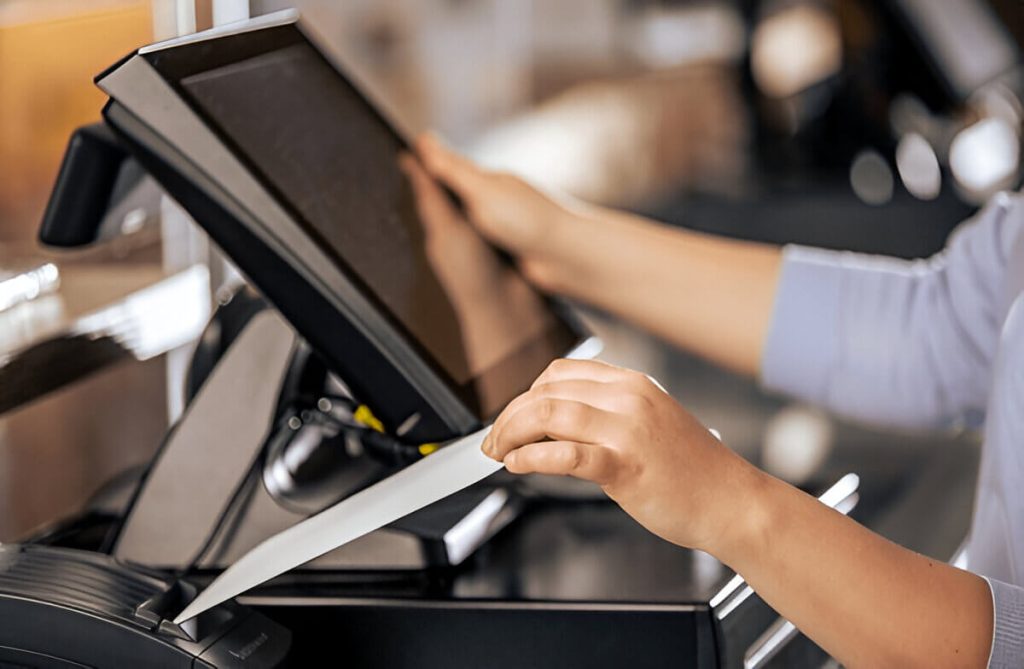
Understanding Point of Sale (POS) systems is crucial in today’s fast-paced business environment. Evolving from cash registers to digital solutions, POS technology enhances operations and customer experiences in retail and hospitality. Choosing the right POS system is key to success. This text explores their evolution, functionality, benefits, applications, and offers guidance on selecting the best solution for specific needs.
What Does POS Stand For and Its Importance
The term “POS” stands for “Point of Sale,” a crucial component in the retail and service industries. At its core, a POS system is where transactions between a business and its customers occur, typically involving the checkout process. Understanding the meaning and definition of POS is essential for businesses looking to streamline operations and improve customer experiences.
A POS system encompasses hardware like cash registers, barcode scanners, and receipt printers, as well as software that manages sales data, inventory tracking, and customer management. The importance of a POS system cannot be overstated; it not only facilitates efficient transaction processing but also provides valuable insights into sales patterns and inventory levels.
By leveraging these insights, businesses can make informed decisions that enhance operational efficiency and boost profitability. Furthermore, modern POS systems often integrate with other business tools such as accounting software or e-commerce platforms, making them indispensable for managing both in-store and online sales seamlessly. In summary, understanding what POS stands for goes hand-in-hand with recognizing its critical role in today’s fast-paced business environment.
The Evolution of POS Systems

The evolution of POS systems is a fascinating journey that reflects the broader technological advancements we’ve seen over the decades. Initially, point of sale systems were simple cash registers, mechanical devices invented in the late 19th century to record sales transactions and safeguard cash. These early machines were revolutionary at the time, providing a basic yet effective way for businesses to manage their sales and finances.
As technology progressed, so did POS systems. The introduction of electronic cash registers in the mid-20th century marked a significant leap forward. These devices offered enhanced functionality, such as inventory management and basic reporting capabilities, which began to transform how businesses operated.
The real game-changer came with the advent of computer-based POS systems in the late 20th century. These modern solutions integrated software that could handle complex tasks like tracking customer data, managing loyalty programs, and generating detailed sales reports. This shift not only improved efficiency but also provided retailers with valuable insights into consumer behavior.
Today’s modern POS systems are highly sophisticated tools that leverage cloud computing and mobile technology. Unlike traditional systems limited by physical hardware constraints, modern POS solutions offer flexibility and scalability. They can be accessed from anywhere via tablets or smartphones, making it easier for businesses to operate across multiple locations or even on-the-go.
In comparing traditional vs modern POS systems, it’s clear that today’s solutions offer far more than just transaction processing; they are comprehensive business management tools that streamline operations and enhance customer experiences. As we look to the future, it’s exciting to consider how emerging technologies like artificial intelligence and machine learning might further evolve these indispensable business tools.
How Modern POS Systems Work
Understanding how modern POS systems work requires a look at both their key components and the functions they perform. At the heart of any point of sale system is its hardware, which typically includes a computer or tablet, a barcode scanner, receipt printer, and cash drawer. These components work together to facilitate transactions smoothly and efficiently.
The software aspect of POS systems is equally crucial. Point of sale software features are designed to streamline operations by managing sales data, tracking inventory levels, and generating reports. Advanced systems may also offer customer relationship management (CRM) capabilities, allowing businesses to track customer preferences and purchase history.
When examining how a POS works, it’s important to recognize its role in processing payments—whether through cash, credit cards, or digital wallets. The integration with payment processors ensures secure transactions while providing real-time sales data that can be analyzed for business insights.
Modern POS systems are an integral part of retail operations due to their ability to enhance efficiency and improve customer service through seamless integration of hardware and sophisticated software features.
The Benefits of Implementing a POS System for Your Business
Implementing a Point of Sale (POS) system can significantly transform the way your business operates, offering numerous advantages that streamline processes and enhance profitability. One of the primary benefits for retail businesses is the ability to improve sales efficiency. With a POS system, transactions are processed quickly and accurately, reducing wait times for customers and minimizing errors that can occur with manual entry.
Moreover, POS systems provide comprehensive insights into sales data, allowing business owners to make informed decisions based on real-time information. This capability not only aids in inventory management by tracking stock levels and identifying best-selling items but also helps in crafting targeted marketing strategies to boost sales further.
Another advantage of POS systems is their ability to integrate with other business tools, such as accounting software and customer relationship management (CRM) platforms. This integration ensures seamless data flow across different departments, enhancing overall operational efficiency.
Implementing a POS system offers substantial benefits for retail businesses by improving sales efficiency, providing valuable insights through detailed analytics, and facilitating better integration with other essential business tools. These advantages make it an indispensable asset for any retailer aiming to stay competitive in today’s fast-paced market.
Diverse Applications of POS Systems Across Industries
Point of Sale (POS) systems have become indispensable tools across various industries, each adapting the technology to meet their unique needs and challenges. In the retail industry, POS systems streamline operations by managing sales transactions, tracking inventory in real-time, and providing detailed customer insights. This allows retailers to enhance the shopping experience through personalized services and efficient checkout processes.
In the restaurant sector, POS systems are tailored to handle complex orders and manage tables efficiently. Restaurant POS systems facilitate quick order processing, integrate seamlessly with kitchen display systems, and offer features like split billing or customizable menu options. These capabilities ensure that restaurants can provide excellent service while maintaining operational efficiency.
The hospitality industry benefits from specialized point of sale solutions that cater to its multifaceted environment. Hospitality POS systems manage everything from room service orders to event bookings, offering a cohesive platform that integrates with property management systems. This integration enhances guest satisfaction by ensuring smooth operations across all service areas within hotels or resorts.
The diverse applications of POS systems highlight their adaptability and essential role in enhancing business operations across different industries. As technology continues to evolve, these systems will likely become even more sophisticated, offering new ways for businesses to improve efficiency and customer satisfaction.
Choosing the Right POS System
Selecting the right point of sale (POS) system is a crucial decision for any small business, as it directly impacts daily operations and customer satisfaction. When choosing a POS system, several factors should be considered to ensure you find the best solution tailored to your business needs.
First and foremost, consider the specific features your business requires. For example, if you run a retail store, inventory management capabilities might be essential, whereas a restaurant may prioritize table management and order tracking. Understanding these needs will help narrow down your options.
Another important factor is ease of use. A user-friendly interface can significantly reduce training time for staff and minimize errors during transactions. Look for systems that offer intuitive navigation and clear instructions to enhance efficiency.
Integration capabilities are also vital when selecting a POS system. Ensure that the system can seamlessly integrate with other software solutions you currently use or plan to use in the future, such as accounting software or e-commerce platforms. This integration will streamline operations and provide comprehensive data insights across all channels.
Cost is an inevitable consideration; however, it’s important not just to focus on upfront expenses but also on long-term value. Compare pricing models (whether it’s a one-time purchase or subscription-based) and evaluate what each package includes in terms of support, updates, and additional features.
Lastly, consider customer support services offered by the POS provider. Reliable support can make all the difference when technical issues arise or when assistance is needed during busy periods.
Embracing the Future with Advanced POS Technology
Embracing advanced POS technology is not just a step forward; it’s a necessary leap into the future of retail and customer service. As businesses continue to evolve in an increasingly digital world, integrating sophisticated point-of-sale systems can provide a competitive edge. These technologies offer far more than basic transaction processing; they enable real-time inventory management, insightful data analytics, and enhanced customer experiences.
By adopting advanced POS solutions, businesses can streamline their operations, reduce errors, and improve efficiency. The ability to analyze sales patterns and customer preferences allows for more informed decision-making and personalized marketing strategies. Furthermore, the integration of mobile payment options and contactless transactions meets the growing consumer demand for convenience and speed.
As we look towards the future, it’s clear that those who leverage these technological advancements will be better positioned to adapt to market changes and meet evolving consumer expectations. Embracing advanced POS technology is not just about keeping up with trends, it’s about setting the pace for innovation in retail.
